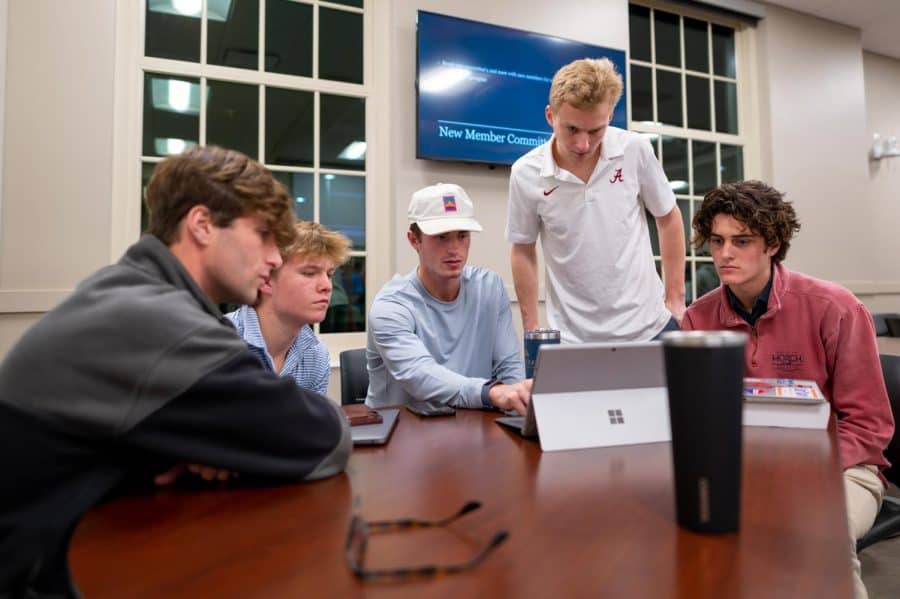Managing millions: A look inside student-run investment organizations
Members of Capstone Asset Management Society work collaboratively during their meeting.
November 9, 2022
Editors Note (11/10): This article was updated to accurately reflect Sarah Shield’s position with CIMG.
For many students at The University of Alabama, internships and co-ops allow them to gain real-world experience in their job fields. However, for students interested in investment and the stock market, they can get that real-world practice on campus — no prior experience required — with clubs that teach them how to responsibly manage investments.
Capstone Asset Management Society and Culverhouse Investment Management Group are two organizations that provide their members with experiential learning in finance and investments.
CAMS utilizes software to simulate the stock market in their portfolio. They are currently simulated stockholders in Goldman Sachs and TJ Maxx, as well as over 20 other large organizations. Their alumni have gotten jobs at J.P. Morgan and PNC Bank.
CIMG operates off donations from Culverhouse College of Business alumni. They currently own stocks in companies such as Dollar Tree and CVS. CIMG alumni are employed at companies such as Wells Fargo, Goldman Sachs and Regions.
Each organization has a competitive application process, in which prospective members complete an application and engage in a behavioral interview. For CIMG, a third round of selection is employed in which students present a stock pitch.
To ensure their members are prepared to make informed investment decisions, CAMS and CIMG both have a training period to teach new members about the value investing skills required to be a successful member.
According to Sarah Shield, a senior majoring in criminal justice and accounting and vice president of investment research for CIMG, and Delaney Carter, a senior majoring in finance and the director of media for CAMS, neither organization requires any advanced knowledge to get involved –, just an interest in investing, meaning that nearly everything members learn is from their involvement in the group.
“CIMG is organized and run very much like a professional investment firm,” said John Heins, CIMG’s advisor and director of the Fitzpatrick Center for Value Investing. “[It] provides its members with real-world experience that, based on the evidence, prepares them very well both to secure great jobs and also to succeed once they have them.”
In each of the two organizations, members join one of eight committees that present stock pitches to the organizations.
The Director of Experiential Learning for Culverhouse College of Business, Quoc Hoang, declined to comment on the organizations specifically, but sent a video highlighting experiential learning at The University of Alabama, in which he said that experiential learning “helps students with the transition from college to career.”
Shawn Mobbs, a UA finance professor, said, in addition to learning practical skills and application, CAMS and CIMG help teach crucial interpersonal skills to its members, which will help them in their careers. They bring students together with people from the industry, allowing students to network.
“Finance is about relationships,” Mobbs said.
Since CIMG’s start in 2009 and CAMS’s in 2017, both organizations bring in an average yearly return that is nearly on par with the Standard and Poor’s 500, the index of the performance of the 500 largest public companies in the United States. The money stays invested in the real and simulated stock markets, though the organizations can make the decision to invest in new stocks. During their time at the University, CAMS’s simulated portfolio has grown to $500k and CIMG’s portfolio to $1.6 million, with average yearly returns of 7.21% and 10.5%, respectively.
“Joining CAMS has taught me so much, not only about investing but, about networking, professionalism and presenting,” Carter said. “I’ve met incredible people that challenge me and teach me something new every day and I couldn’t be more grateful.”
Dixie Hamner, advising specialist for the Department of Economics, Finance, and Legal Studies; Susan Cowles, director of the Culverhouse College of Business Career Center; and Hoang, all declined to comment several times on the benefits of CAMS and CIMG, repeatedly referring The Crimson White back to Heins.





















